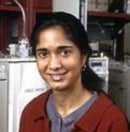Spring 2006
ADVANCE EVALUATION COMMITTEE
Faye Boudreaux-Bartels, College of Engineering
Lisa DiPippo, College of Arts & Sciences
Joan Peckham, College of Arts & Sciences
Karen Wishner, Graduate School of Oceanography
COUNCIL FOR RESEARCH
The ADVANCE Evaluation Committee, in conjunction with the URI Research Office, received 17 excellent proposals that met the goals of ADVANCE. Of these, 9 were awarded funding. The names, project titles, and abstracts appear below. Congratulations to all.
And The Winners Are…

Fatemeh Akhlaghi
Applied Pharmacy Science
Biomarkers of Immunosuppression in Diabetic Kidney Transplant Recipients
Abstract:
Approximately 50 percent of all kidney transplant recipients are diabetics. Diabetes may influence the degree of immunocompetence and making patients prone to infections however currently immunosuppressive therapy in diabetic (D) transplant patients is similar to non diabetics (ND). We have recently measured two different biomarkers of immunosuppressive activity in transplant recipients (D=9, ND=9) in addition to the concentration of the immunosuppressive agents cyclosporine or tacrolimus and mycophenolic acid. We have found that both biomarkers including inhibition of Inosine Monophosphate Dehydrogenase (IMPDH) and the intracellular production of cytokines (IL-2, TNF-alpha and IFN-gamma) within T-lymphocytes were significantly lower in diabetic patients despite comparable of the immunosuppressants. We hypothesize diabetic patients require lower doses and/or concentrations of immunosuppressive drugs to achieve the same degree of immunosuppression. The SPECIFIC AIM of this project is to compare the degree of immunosuppression using four well established ex vivo methods of measuring T and B cell functions in a larger number of patients and to compare the results with non transplanted diabetic patients.

Bethany D. Jenkins
CELS-CMB
Linking the distribution and expression of nitrogen assimilation genes to the ecological partitioning of marine cyanobacteria
Abstract:
ADVANCE incentive funds are requested for the costs associated with generating preliminary data to be used in a proposal submitted to the National Science Foundation. I am interested in understanding how populations of cyanobacteria, extremely important primary producers in the ocean, are structured with respect to the nitrogen sources they can utilize. I have developed methods to target genes in nitrogen assimilatory pathways in natural populations of cyanobacteria. I would like to extend these methods and demonstrate their feasibility in combination with cell sorting methods. Funding from ADVANCE would provide valuable resources to strengthen future federal funding requests.

Roberta S. King, Ph.D.
BPS/Pharmacy
Structure-Guided Design of Estrogen Sulfotransferase Inhibitors
Abstract:
Dr. King’s research aim is to develop specific inhibitors of the human form of an important enzyme, estrogen sulfotransferase. This enzyme is thought to be involved in the tight biological control of physiological estrogens within local tissues in humans and other species. Development of molecules which inhibit only estrogen sulfotransferase would facilitate experiments designed to more clearly confirm the physiological role of estrogen sulfotransferase in estrogen regulation in vivo. We will use a rational drug design strategy, complemented with biochemical assays, for a novel approach to sulfotransferase inhibitor development. The Incentive Award is requested to enhance Dr. King’s research and professional development.

Laura Meyerson
CELS-NRS
Use of long-term state-wide data sets to explore relationships between land use change, water quality and the spread of invasive alien plant species
Abstract:
Long-term data sets are extremely valuable resources to environmental researchers seeking explanations for observed biotic and abiotic changes over time. This pilot research proposes to use two such data sets for Rhode Island in order to better understand the relationships that exist between land use change, water quality and biological invasions by plant species. Exploratory data analyses will be conducted to integrate data collected by the URI Watershed Watch program and the URI Environmental Data Center. A URI undergraduate will assist with this research. The results of this work will form the basis for a grant proposal to the National Science Foundation.

Kate Moran
Ocean Eng. & Oceanography
Student Support for Arctic Coring Expedition (ACEX) Core Analyses
Abstract:
We propose to reconstruct the history of sea-ice in the Arctic Ocean. The cores taken on the Arctic Coring Expedition (ACEX) provide the first paleoceanographic record of the region, going back roughly 57 Million years. ACEX intends to reconstruct the paleoceanographic history of the Arctic with emphasis on unraveling the history of sea-ice cover, a major component of Earth’s climate today and in the past. The objective of this proposal is to develop a multi-proxy approach to identify and characterize the extent and magnitude of sea–ice cover in the Arctic, ultimately aiding our understanding of the driving mechanisms of climate change.

Rebecca Nelson Brown
Plant Sciences
The Development of SSR Primers for Genetic Mapping and Population Studies in Festuca subgen. Festuca
Abstract:
Environmental Concerns are increasing the demand for lawns which use less water, fertilizer, and pesticide. Fine Leaf Fescues (Festuca subgen. Festuca) tolerate many stresses. Identification of the underlying genes could improve fine leaf fescues and other grasses. These traits must be mapped to specific sections of the genome to identify candidate genes from related species with more genomic tools. The first step in map construction is to develop SSR markers which can be used between species. These markers can also be used to examine the genetic diversity among the closely related fine leaf fescue species and subspecies.

Yana Reshetnyak
Physics
NOVEL TECHNOLOGY FOR CANCER DIAGNOSTICS
Abstract:
Novel technology for cancer diagnostic is based on our discovery of membrane peptide pHLIP (pH Low Insertion Peptide), which inserts into cell membrane only at low pH (high acidity) translocating one of its terminus inside cell. We found that attachment of cargo molecules (diagnostic probes) to the terminus, which stay outside of cell, does not affect the insertion process. Since one of the main physiological characteristics of cancer tissue is enhanced local acidity, imaging agent linked to the pHLIP would be selectively delivered and accumulated in tumor. The proposed method will significantly increase contrast of imaging agent and accuracy of the imaging methods. The main goal of the proposed project is to study distribution of pHLIP-imaging probe in mice bearing tumor using whole-body fluorescence imaging technique.

Carol Thornber
Biological Sciences
The Community Ecology of Macroalgal Blooms in Narragansett Bay and the Cape Cod National Seashores.
Abstract:
Macroalgae are a vital part of coastal marine ecological communities. They form the base of the food chain, as well as potential habitat, for a wide variety of marine species. In many locations worldwide, macroalgal “blooms” (rapid, seemingly uncontrolled growth resulting in a high abundance of biomass) have become increasingly frequent and can have large impacts on their local marine environment, as well as negative economic impacts on nearby coastal areas. The formation, abundance, and distribution of these blooms are poorly understood and may vary widely. Along the New England coast, blooms have been reported in several areas, including Narragansett Bay and the Cape Cod National Seashore. In this proposal, I outline a combination of field sampling and laboratory experiments to investigate the ecological dynamics of bloomforming species in these two geographically (and biologically) distinct areas. Repeated field surveys at several sites within each area will yield a comprehensive analysis of the species composition, distribution, and abundance of macroalgal blooms across the peak of bloom formation (summer and early fall). Tissues will be preserved from all surveys for further analysis of tissue nutritive content. Jointly with these field surveys, I will conduct a series of feeding preference experiments to determine the relative palatability of macroalgal bloom species from each area to abundant co-occurring herbivores (such as snails and amphipods). These data will indicate if bloom-forming macroalgal species are highly palatable and are thus providing a large biomass of food for common herbivores, or if bloom-forming species are less palatable (or unpalatable) than non-bloom forming algal species.

Padma T. Venkatraman
Coordinator of Graduate Diversity Affairs
Graduate School, URI
WOMEN IN OCEANOGRAPHY: PERSPECTIVES
Abstract:
Women and minorities are underrepresented in the field of oceanography. This proposal describes a seminar series that features eminent female oceanographers, and is designed to accomplish three main goals: (1) promote climate change at URI, (2) provide opportunities for female faculty at URI to promote their careers through networking and collaborative research, and (3) encourage the recruitment and retention of current female and minority graduate students and undergraduates at URI by presenting active role models in the field, with whom they can interact in formal and informal settings.
 URI Homepage
URI Homepage






